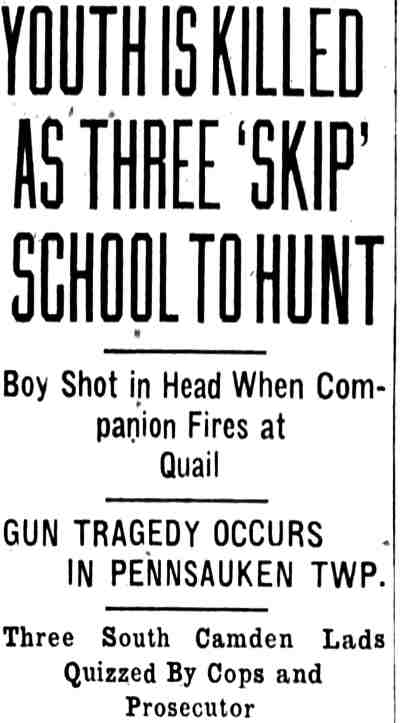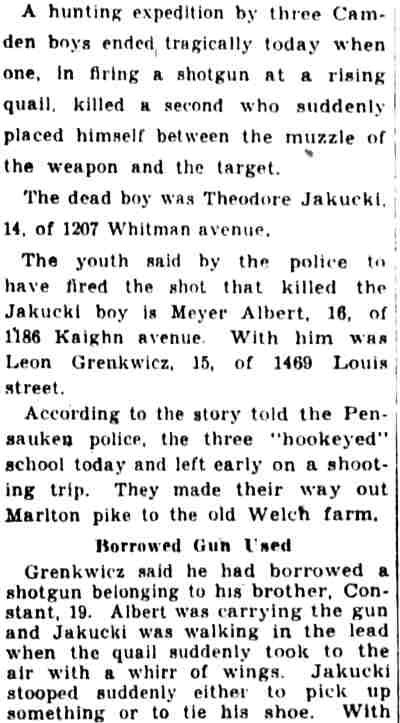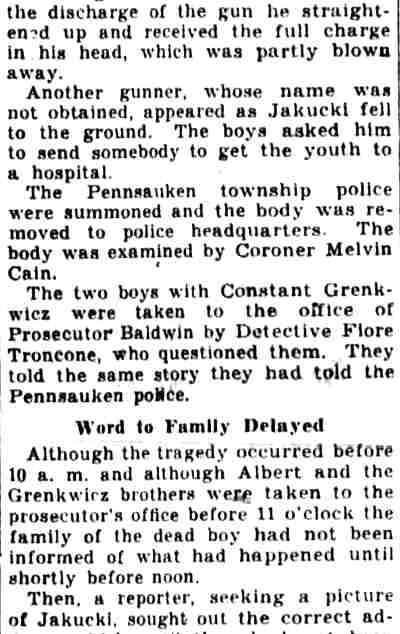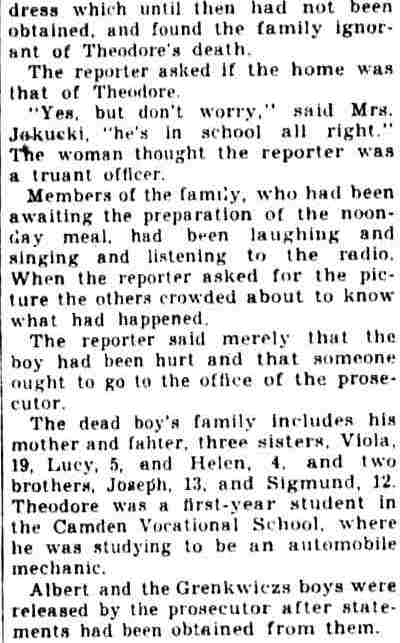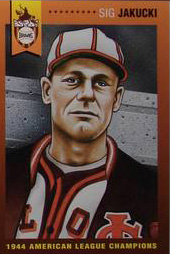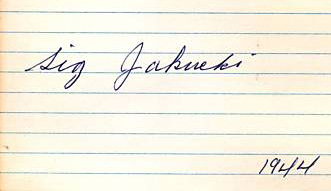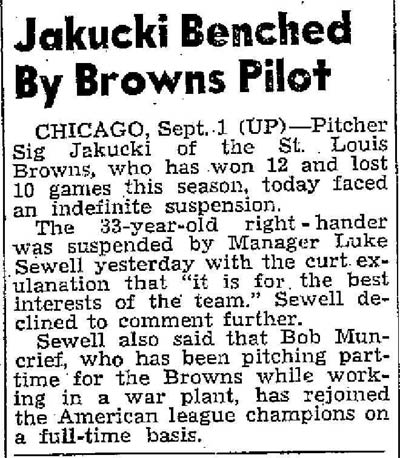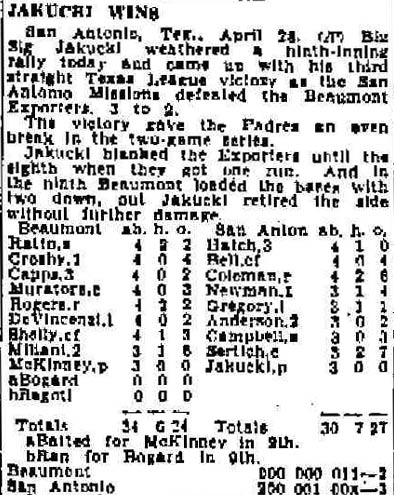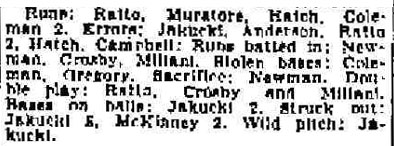|
Sig
Jakucki, who was generally known to his teammates as Jack, grew
up to become a 6'2", 198 pound right-handed pitcher who
featured a sinking fastball and a curve ball. He compiled a
25-22 record with a 3.79 earned run average, mostly during the
1944 and 1945 seasons.
Sig
Jakucki played baseball for the
Polish
American Citizens Club in
Camden. In 1927 he enlisted in the United States Army. Stationed
at Schofield Barracks in Hawaii, he became a star slugger and
occasional pitcher for the barracks' baseball team. When his
term of enlistment ended in 1931, he stayed in Hawaii to play
semipro ball, first with the Honolulu Braves and later with
Asahi, team that as author William B. Mead put it,
"was made up of Hawaiians of Japanese descent, Hawaiians of
Portuguese descent, and one hefty towhead of Polish descent
named Jakucki."
Sig
Jakucki became such a star in Hawaii that on the recommendation
of Bill Inman, scout for the San Francisco Seals of the Pacific
Coast League, fans paid his way to
San Francisco for a tryout as an outfielder. The Seals were set
with Joe DiMaggio in the outfield, but Jakucki caught on with
the Oakland Oaks. However, he wasn't quite ready for the AAA
level pitching and was let go in May. He caught on with the
Galveston Sand Crabs of the Texas
League, where manager Billy Webb converted him to a full-time
pitcher. He reesponded by posting a 10-7 record in 1934, and won
15 games the following year. Still with Galveston in 1936,
Jakucki had
lost nineteen
games by late August, but pitched well enough to catch the
Browns' eye; they brought
him up. He lost three games, won none, and failed to impress
manager Rogers Hornsby. Bill DeWitt, who was with the Browns at
the time said:
"Hornsby
didn't like the guy, so in spring training of 1937 we sent him
back to the minors. He bounced around from one club to another,
and he'd get drunk all the time, so he got released. Then he
started
pitching
for these semi-pro clubs in Galveston and Houston. He was a
paperhanger and painter during the week and then he'd pitch on
weekends.
We
had forgotten all about him. Then in the spring of '44 we were
short of
pitchers, and this fellow down in Texas told us about him. He
says, 'You better get this guy. He can win some games for you.'
So we got him."
The
Browns sent Sig Jakuki back to Galveston on April 1, 1937. He
had won three and lost six before being sent to the New
Orleans Pelicans of the Southern Association. He won twelve
games and lost six. He also made the acquaintance of
ex-Philadelphia Phillie hurler Euel Moore. According to Arthur
Daley in the
New York Times
,
Jakucki
and Euel Moore once went to see a wrestling match after a game.
The hefty, playful Moore had the reputation of being the
strongest man in baseball, and in Jakucki he found a kindred
soul. The wrestling match turned out to be slightly on the
boring side, so to provide some excitement, Moore picked up the
200-pound Sig, and tossed him into the ring. The startled
grapplers thought Jakucki was merely part of the act and that
someone had forgotten to tip them off. But the indignant referee
took a swing at Jakucki, a sad mistake. Jakucki flattened him.
Thereupon the two wrestlers pounced on the interloper, also a
mistake. Moore joined in until the police broke up the
free-for-all and carted Jakucki and Moore to the nearest
jail.
Despite
his winning record, the Pelicans did not bring Sig Jakucki back
in 1938. On February 4 he was sold to the Los Angeles Angels of
the Pacific Cast League, but did not play, and it appeared that
his career as a professional baseball player was over. He
bounced around Texas and Kansas, playing semi-pro ball and
eventually ended up working at a shipyard in Houston.
"Jakucki
would get drunk. He pitched in the National Semi-pro Tournament
in 1940 for Houston Grand Prize beer. They won third place.
Jakucki got stiff, and he got angry at an umpire, and he
accosted him crossing the Arkansas River right outside Lawrence
Stadium
in Wichita, and he dangled the umpire over the rail by his
heels. Oh, he was something, that Jakucki. Luke Sewell had some
real cutthroats to handle."
After
the shipyard job ended Sig Jakucki returned to Galveston where
he worked as a painting and wallpaper subcontractor. When
the Browns surprised Jakucki with a contract, the big
right-hander was 34 years old and had been out of organized
baseball for six years. But he had become something of a legend
in semi-pro ranks. Bob Broeg of the St. Louis Post
Dispatch:
Sig
Jakucki clinched the Browns' only pennant with a 5-2 win over
the Yankees on the last day of the 1944 season. His heavy
drinking, however, resulted in his suspension the following
year.
The
1944 baseball season was the peak—or, to look at it
another
way, the nadir—of wartime baseball. The National League
didn't embarrass itself; the Cardinals won their third straight
pennant behind respectable ballplayers like Marty Marion, Walker
Cooper, Johnny Hopp, and especially
Stan
Musial.
But
in the American League, the acute shortage of players dragged
the entire league down to the level of the St. Louis Browns,
perennial doormats who had finished in the second division nine
out of the previous ten seasons. The dismal Browns had never won
a pennant in 43 years of American League competition.
The
1944 Browns were relatively untouched by the military draft, as
they featured an all-4F infield, nine players on the roster 34
years old or older, and a motley collection of notorious
characters, such as Tex Shirley and Mike Kreevich. Sig Jakucki,
who went 13-9 with a 3.55 ERA that year, had as stated above,
was rediscovered pitching for a Houston industrial-league
semi-pro team.
Rounding
out the staff were old men Nels Potter (who went 19-7 with a
2.83 ERA) and Denny Galehouse (9-10), and youngsters Jack Kramer
(who finished 17-13 with a 2.49 ERA) and Bob Muncrief (13-8).
The big hitters for the Browns were 23-year-old shortstop Vern
Stephens, who hit .293 and was second in homers with 20 and
first in RBI with 109, and Kreevich, the team's only .300 hitter
at .301.
St.
Louis won its first nine games of the season, and continued to
surprise the baseball world by hanging tough in a four-team race
with Detroit, Boston, and the Yankees. The race came down to the
final week, when the Browns defeated New York five times,
winning the pennant by 1 game over Detroit.
Jun
29, 1944 - The Yanks move to 2 1/2 games behind St. Louis
with a 1-0 win over Sig Jakucki. Walt Dubiel gives up 2 hits for
the win.
Jul
4, 1944 - Sig Jakucki‚ the Browns 34-year-old rookie‚
threw his 3rd shutout in 4 games‚ blanking the Athletics‚
4-0. Sig has given up 1 run in 27 innings. The win keeps the
Browns 1 1/2 games ahead of Boston. The A's win the nitecap‚
8-3‚ behind Hot Potato Hamlin‚ who strands 10 runners.
Frankie
Hayes has a HR to tie for the AL lead with 9.
Jul
8, 1944 - At Washington‚ the
Browns
edged the Nationals‚ 5-4‚ behind Sig Jakucki. Sig walked
7‚ including 3 intentional walks to
Stan
Spence.
Johnny
Niggeling gives up 10 hits and strikes out 10 in losing
to
the league-leaders.
Sep
26, 1944 - Sig Jakucki pitched the
Browns
to a 1-0 win over the
Red
Sox to keep St. Louis in 1st place.
Oct
1, 1944 - The Browns have their first sellout in 20 years‚
and their largest crowd ever‚ as 37‚815 pack Sportsman's
Park. St. Louis clinches the flag on the final day of the season
by sweeping the series with the Yankees and coming from behind
to win 5-2. The big blows are a pair of 2-run HRs by
Chet
Laabs‚ off Mel Queen. Sig Jakucki was the winning
pitcher.
St.
Louis clinched the flag with victory over New York on two home
runs by Chet Laabs and one by Stephens. The Browns finished with
a record of 89-65, which was, at the time, the worst record ever
by an American League pennant-winner.
The
night before the pennant-winning game against the Yankees, Sig
Jakucki,
who was the scheduled starter, was spotted by Browns' team
trainer Bob Bauman entering the team hotel with a bag of whiskey
bottles. Jakucki was a terrible drinker, and Bauman- seeing the
Browns' first pennant disappear in a Jakucki bender- accosted
the pitcher. "You're not going to take that to your
room", Bauman shouted. Jakucki resisted, and swore he would
not drink that night.
The
next morning, at the ballpark, Bauman immediately realized that
Jakucki had indeed been drinking. Jakucki defended himself: He
admitted he had promised not to have a drink the night before,
and insisted he hadn't. But, he added' "I didn't promise I
wouldn't take one this morning."
Jakucki
proceeded to outpitch the Yankees Mel Queen, and the Browns took
the game, 5-2. The Browns had won the pennant!
The
World Series was another story. Starting Game Four for the
Browns, Jakucki gave up a first inning single to Cardinal first
baseman Johnny Hopp. Stan Musial followed with a two run homer.
Jakucki was touched for another run in the third when Danny
Litwhiler scored on a Walker Cooper single. The Cardinals went
on to win the World Series in six games.
The
Browns were contenders the following season, but fell short for
a variety of reasons. Symptomatic of the Brown's 1945 season
were the events of June 19, 1945.
June
19, 1945 - At St. Louis‚ in what
will be dubbed the "Battle of the Dugouts"‚ the 8th
inning produces fireworks as the
White
Sox score 4 runs to eventually win‚ 4-1. After reliever
George
Caster is lifted‚ he fires the ball into the
White
Sox dugout‚ prompting manager Jimmie Dykes to come out
and
protest.
Browns
catcher
Gus
Mancuso tells Dykes to shut up Karl Scheel‚ a Sox bench
jockey who has been mercilessly "riding" the
Browns.
When Dykes says you can find him in the dugout‚ a few
Browns‚
led by Sig Jakucki and
Ellis
Clary‚ do just that‚ giving a Scheel a "most
brutal" (according to Dykes, that is) pounding. The
ex-Marine required first aid but traveled with the team to
Cleveland. About 100 spectators milled onto the field to try and
see the action. In Cleveland‚ Dykes sent a telegram to Will
Harridge accusing
Browns
manager
Luke
Sewell with instigating the riot.
The
1945 Browns' also featured the big league's only one-armed
player, outfielder Pete Gray. Gray was not a particularly
popular fellow, and Sig Jakucki, who later wound up in prison,
was not always the kindliest of men, either. One story about the
two states that when Gray asked Jakucki if he might help him tie
his shoes, Jakucki replied, "Tie your own goddamned shoes,
you one-armed son of a bitch." The eventually got into an
argument one day and settled it with a fight. Jakucki agreed to
fight with one arm held behind his back.
Sig
Jakucki's final game was on August 29, 1945. He started at home
against the league-leading Detroit Tigers, but was taken out in
the third inning by manager Luke Sewell. He proceeded to get
very drunk that night, and showed up late and intoxicated the
next morning at Union Station in St. Louis, from where the
Browns were to travel to Chicago and beyond.
The
Brown's manager Luke Sewell's patience concerning Jakucki's
drinking and behavior, and the Browns play in general finally
wore out on August 30 and August 31, 1945. Although the Browns
were still in the pennant race, the right-hander was given his
unconditional release. Some say that the defensive liabilities
of the one-armed outfielder combined with the release of
Jakucki, who had a 12-10 record at the time, may have cost the
Browns a second trip to the World Series. Without a doubt both
contributed to manager Sewell's decision to quit the
team.
Browns'
trainer Bob Bauman told author William B. Mead of the events
that led to Jakucki's release:
"We
were leaving Union Station in St. Louis around 8 a.m. I'm
standing out there, checking to make sure they all get on the
train. Everybody is there but Jakucki. He comes late; he's
carrying a bag of liquor in one hand and a suitcase in the
other. He couldn't walk straight, he's so drunk.
"Sewell
says, 'You're not getting on thee train. Turn around and go
back. You're through.' Jakucki says, 'No, I'm not. I'm going on
the train.' He drops the suitcase and starts swinging, but he
can't hurt anybody.
"Sewell
got on the train, hollered at me to get on, and told the porter
'Don't let him in the car.' The porter's standing on the
area-way between the two cars. Jakucki climbs up there. He drops
his grip and it breaks the porter's tow.
So
the train starts. Jakucki's between the two cars. Sewell has the
conductor get the police to take him off at Delmar Station [a
passenger station in suburban St. Louis]. Shortest trip in
history.
That
night about midnight, [Brown's Traveling Secretary] Charley
DeWitt gets a call. Jakucki's in the lobby; wants a room. Know
how he got to Chicago? Hopped a freight. They won't give him a
room, so he lays down on one of the divans.
Coming
down in the morning, it was one of the funniest sights I've ever
seen. Here he is, peeking around a corner. He's been sleeping
down in that lobby all night long. He's got a dirty shirt on;
looks like he just got out of jail.
DeWitt
told him he was through with the ballclub. That was where his
career ended."
There
were, however, still teams willing to pay Sig Jakucki to play
baseball. He pitched for the San Antonion Missions in the Texas
League in 1946. Still in good form on the mound, he won his
first three decisions, and was still with the team at the end of
the season. The Missions were affiliated with the Browns,
apparently Sig Jakucki had not burned all of his bridges behind
him. On of his teammates on the missions was a young pitcher
named Ned Garver. Garver went up to the majors with the Browns
in 1948. He managed to win 20 games for the big club in 1951,
quite an achievement as the Browns lost 102 games that year.
Garver remains the only pitcher in American League history and
modern baseball history (post-1920) to win 20 or more games for
a team which lost 100 or more games in the same season and the
only pitcher in Major League history to do so with a winning
record.
The
Missions traded Sig Jakucki to the Seattle Raniers in the
Pacific
Coast League after the 1946 season ended. On April 19, 1947 Sig
Jakucki
surrendered a home
run to San Francisco Seals outfield Joe Brovia. Brovia's ball
carried 560-feet over the 40-foot high center-field fence at
Seals Stadium.
Well
into his late 30s, Sig Jakucki could still pitch. His exploits
on and off he field in Seattle were as such- Sig would pitch a
three-hitter and celebrate by taking two or three days
off.
The
Rainier's saintly general manager, Earl Sheely, did his best to
reform him, leading to a perhaps apocryphal story. To keep Sig
out of bars, Sheely would drive him home. One night he drove by
the Rainier Brewery, where the midnight shift was going full
blast.
"See
that, Sig," Sheely said. "You can't drink it as fast
as they can make it."
"Maybe
not," Sig said, "but I got 'em workin' nights."
Things
did not go well for Sig Jakucki after that. He returned to
Houston, Texas where he had been living before the Browns called
him up, and then to Galveston. His alcoholism left him living on
the streets, and begging for what he could. He would
occasionally go to Houston, drop in the city hall to talk over
old times with his old friend Frank Mancuso, who had been a
reserve catcher on the 1944 and 1945 Browns teams. He never
asked for anything, but when the former pitcher was ready to
head back to the streets Mancuso would slip something into
Sig's pocket. Frank was always pleased to see his friend
come in although he might not see him for months. The bottle
ruined Sig's life, and eventually caused his
death.
Sigmund
"Sig" or "Jack" Jakucki passes away on May
28, 1979 in Galveston, Texas at the age of 69. Truth be known,
near the end of his life, Sig had fallen upon hard times due to
bad health and personal problems. He was fortunate to have the
nearby friendship of Frank Mancuso, one of his teammates from
the 1944 Browns American League championship club. Frank Mancuso
pretty much took care of Jakucki in his waning months, including
paying for his burial. Not wanting to feel like a burden upon
Frank, Sig insisted that Frank hold onto his watch as collateral
for the help.
In
later years, when anyone would ask about the beat-up watch,
Mancuso, who had made a career as a politician in Houston would
say “That old ticker has been on my desk for years, and not a
day goes by that I don't look at that old Timex and think of
Sig and the talks we used to have. He was a great pitcher
with lots of potential, he just got lost along the way.”
|
